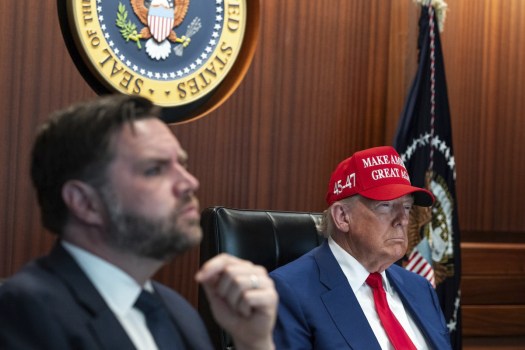URGENT UPDATE: Shocking revelations from private chats involving members of Young Republican groups have surfaced, detailing extreme views and radicalization within right-wing culture. The conversations included derogatory references to Black individuals, admiration for Adolf Hitler, and violent rhetoric about political opponents, prompting immediate outrage.
These disturbing discussions were highlighted by Vice President JD Vance, who previously made headlines for his controversial claims regarding Haitian immigrants in Springfield, Ohio. Vance expressed frustration not at the hateful comments made by GOP activists but at the backlash against them, labeling it as “pearl clutching.” This response raises serious concerns about the normalization of bigotry within the party.
The chats, reported by Politico, reveal that members of these groups referred to Black people as “monkeys” and discussed horrific actions, including musings about gas chambers and suicide. Their comments have drawn condemnation, although Vance’s dismissal of the criticism highlights a troubling trend of defending radical viewpoints.
The Young Republicans organization did release a statement denouncing the comments, signaling a potential divide within the party. However, many within the MAGA base criticized them for this stance, suggesting that these views may be more widely accepted than previously thought.
The implications are significant. The Republican Party, once characterized by a diverse coalition, appears increasingly dominated by a faction that embraces extreme ideologies reminiscent of the Old Right. This shift is evidenced by the rise of public figures like Candace Owens and Tucker Carlson, who have mainstreamed far-right rhetoric.
As the New York Times reported on the same day these chats emerged, the administration is considering drastic changes to the U.S. refugee system, potentially favoring English-speaking white South Africans and Europeans. This aligns with long-held desires of radical factions within the party, raising alarms about the future direction of U.S. immigration policy.
The radicalization of young GOP members is not an isolated incident but part of a broader trend reflecting a party increasingly comfortable with cruelty and intolerance. Vance’s comments and the reactions from within the party underscore a disturbing reality: many are willing to overlook or even embrace hate as they rally behind a populist agenda.
As these developments unfold, the potential for further radicalization looms large. Observers are urged to consider the implications of these chats and the responses they have elicited. The future of the Republican Party—and its stance on issues of race, immigration, and human rights—hangs in the balance.
The time to address these issues is now. Stay informed as this story continues to develop, and consider the impact of these radical views on society at large.







